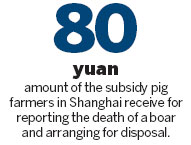Tracking system to keep tabs on Zhejiang livestock, poultry
Updated: 2013-05-29 08:10
By Zhou Wenting in Shanghai and Yan Yiqi in Hangzhou (China Daily)
|
||||||||

A system for keeping track of livestock and poultry will be implemented throughout Zhejiang province to prevent instances like the one in which more than 11,000 pig carcasses ended up in the Huangpu River earlier this year.
All livestock and poultry will wear an electronic ear tag so that any unsafe disposal of dead animals can be traced to individuals and farms.
Offenders will face punishment, said the Standing Committee of Zhejiang Provincial People's Congress, which presented the draft of the new legislation on Monday.
Ear tags will act as ID cards for animals, containing information on the farm they belong to and immunization and eventual quarantine records.
In March, more than 11,000 pig carcasses were recovered from the Huangpu River, which provides 22 percent of Shanghai's tap water.
Most of the pigs, which died from diseases, were believed to have floated down the river from Jiaxing, Zhejiang province.
Jin Yuying, director of Zhuangshi village in Jiaxing's Nanhu district, was quoted in March as suggesting that local farmers had simply dumped the carcasses into the river.
According to Yu Zhongda, deputy secretary-general of the provincial Party committee, Zhejiang province faces a considerable challenge in dealing with pollution caused by its livestock and poultry farming.
"Take Jiaxing, for example. The city raised 7.34 million pigs last year, and half were from no more than 10 villages, which led to severe environmental problems including water pollution," he said.
"The density of livestock and poultry has exceeded environmental capacity."
To deal with dead livestock, "governments at all levels should establish disposal centers for livestock that die from diseases", said Yu.
The standing committee has also suggested phasing out small-scale farms, which industry insiders believe to be the cause of much of the pollution.
"Cold storage and disposal areas to handle pig carcasses are required on large-scale farms, but the equipment used and disposal methods on smaller operations is often of a poor standard," said Yang Zhenxi, secretary-general of Shanghai Swine Trade Association.
Shanghai's animal disposal system is considered among the best in China and has the country's first incinerator to dispose of the carcasses of diseased animals.
"Since 2002, any pig farmer reporting the death of an animal has to arrange for it to be collected and disposed of," Yang said.
"They are given 80 yuan ($13) subsidy for a boar and 2,000 yuan for a sow, which is a strong incentive for farmers to properly deal with dead animals," he said.
The tracking system will make it possible by the end of the year for Shanghai residents to find out where all pork products originate, according to Shanghai Municipal Commission of Commerce.
Yang Ming, a 25-year-old Shanghai resident, was pleased with the plans.
"The Huangpu River incident paralyzed pork sales in the city and made the safety of tap water and the environment questionable.
"We hope these measures will deter lawbreakers, especially at this time when the public's faith in food safety is so brittle."
Contact the writers at zhouwenting@chinadaily.com.cn and yanyiqi@chinadaily.com.cn
(China Daily USA 05/29/2013 page4)

 Michelle lays roses at site along Berlin Wall
Michelle lays roses at site along Berlin Wall
 Historic space lecture in Tiangong-1 commences
Historic space lecture in Tiangong-1 commences
 'Sopranos' Star James Gandolfini dead at 51
'Sopranos' Star James Gandolfini dead at 51
 UN: Number of refugees hits 18-year high
UN: Number of refugees hits 18-year high
 Slide: Jet exercises from aircraft carrier
Slide: Jet exercises from aircraft carrier
 Talks establish fishery hotline
Talks establish fishery hotline
 Foreign buyers eye Chinese drones
Foreign buyers eye Chinese drones
 UN chief hails China's peacekeepers
UN chief hails China's peacekeepers
Most Viewed
Editor's Picks

|

|

|

|

|

|
Today's Top News
Shenzhou X astronaut gives lecture today
US told to reassess duties on Chinese paper
Chinese seek greater share of satellite market
Russia rejects Obama's nuke cut proposal
US immigration bill sees Senate breakthrough
Brazilian cities revoke fare hikes
Moody's warns on China's local govt debt
Air quality in major cities drops in May
US Weekly

|

|







